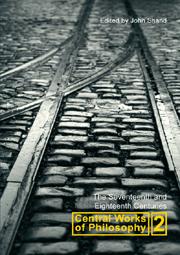Book contents
- Frontmatter
- Contents
- Contributors
- Preface
- Seventeenth- and Eighteenth-Century Philosophy: Introduction
- 1 René Descartes: Meditations on First Philosophy
- 2 Baruch Spinoza: Ethics
- 3 G. W. Leibniz: Monadology
- 4 Thomas Hobbes: Leviathan
- 5 John Locke: An Essay concerning Human Understanding
- 6 George Berkeley: A Treatise Concerning the Principles of Human Knowledge
- 7 David Hume: A Treatise of Human Nature
- 8 Jean-Jacques Rousseau: The Social Contract
- Index
5 - John Locke: An Essay concerning Human Understanding
- Frontmatter
- Contents
- Contributors
- Preface
- Seventeenth- and Eighteenth-Century Philosophy: Introduction
- 1 René Descartes: Meditations on First Philosophy
- 2 Baruch Spinoza: Ethics
- 3 G. W. Leibniz: Monadology
- 4 Thomas Hobbes: Leviathan
- 5 John Locke: An Essay concerning Human Understanding
- 6 George Berkeley: A Treatise Concerning the Principles of Human Knowledge
- 7 David Hume: A Treatise of Human Nature
- 8 Jean-Jacques Rousseau: The Social Contract
- Index
Summary
John Locke (1632–1704) was a man of wide intellectual interests. During the last 15 years of his life he published a series of books on a range of subjects that included politics, religion, economics and education, but in general philosophy all his energy was devoted to a single project. The Essay concerning Human Understanding, first published in 1690, is by far the most important of Locke's philosophical works. Four editions appeared during his lifetime and a fifth shortly after his death; all the later editions introduce significant changes, and both the second (1694) and the fourth (1700) contain wholly new chapters. The only other philosophical writings that Locke himself published (in 1697 and 1699) were a set of three very long letters defending the Essay against the criticisms of Edward Stillingfleet, Bishop of Worcester. After his death his literary executors published two shorter works that had originally been planned as chapters of the Essay but had grown too long for that purpose: the Conduct of the Understanding and the Examination of Malebranche.
The composition and purpose of the Essay
In the Epistle to the Reader that served as a preface to the Essay, Locke described how the work had arisen out of discussions with five or six of his friends on a quite different topic, and “having been thus begun by Chance, was continued by Intreaty; written by incoherent parcels; and, after long intervals of neglect, resum'd again, as my Humour or Occasions permitted”. The survival of material among Locke's own papers confirms the general accuracy of this story, and allows a few dates to be added.
- Type
- Chapter
- Information
- Central Works of Philosophy , pp. 115 - 136Publisher: Acumen PublishingPrint publication year: 2005



